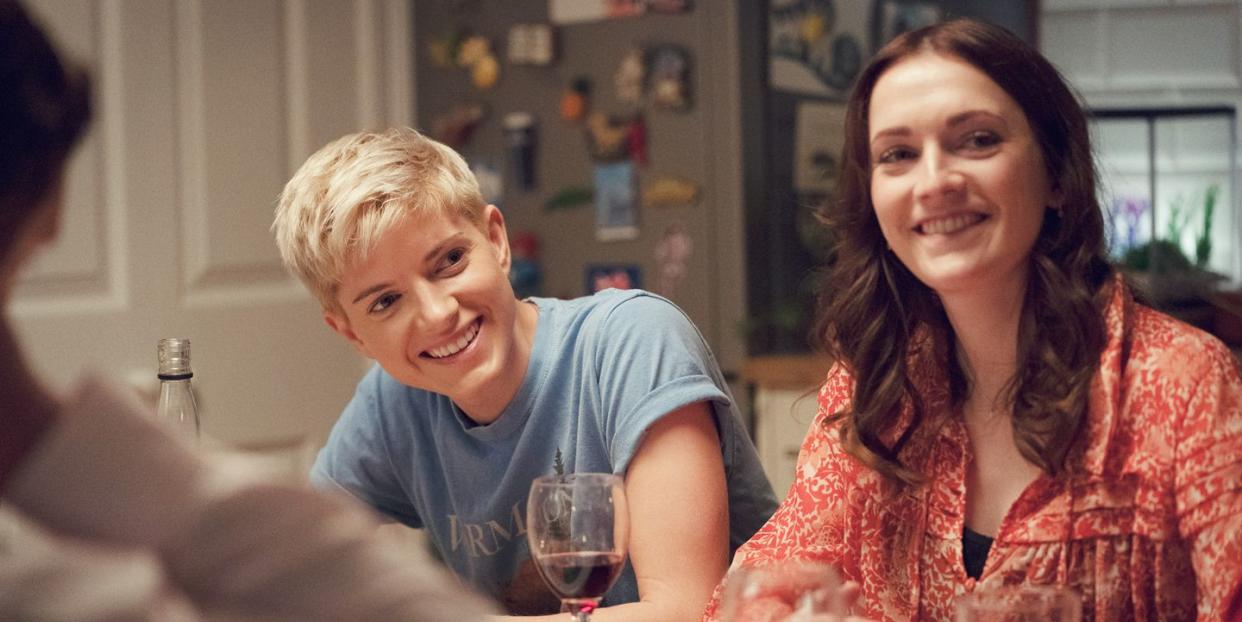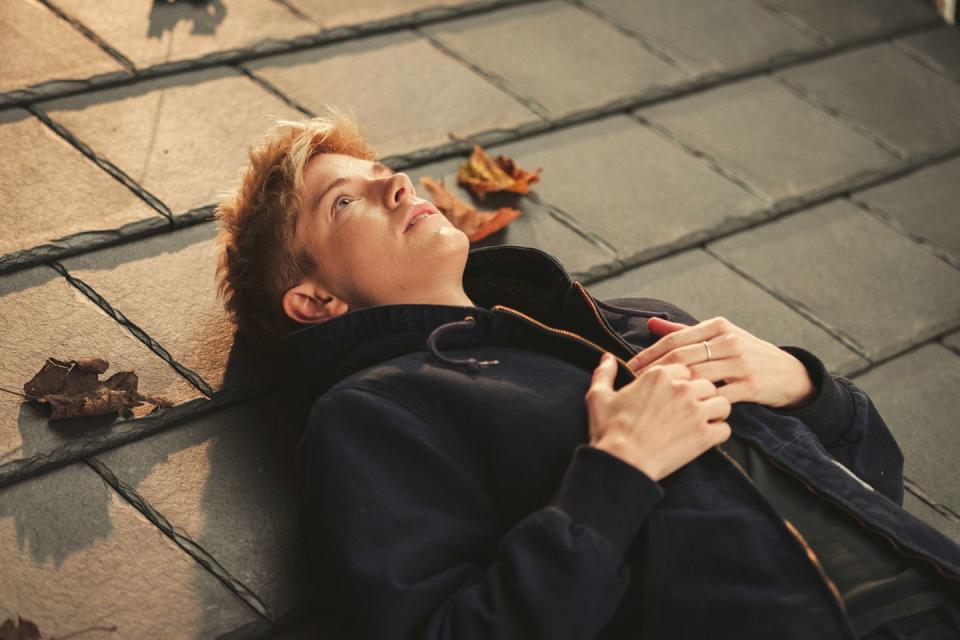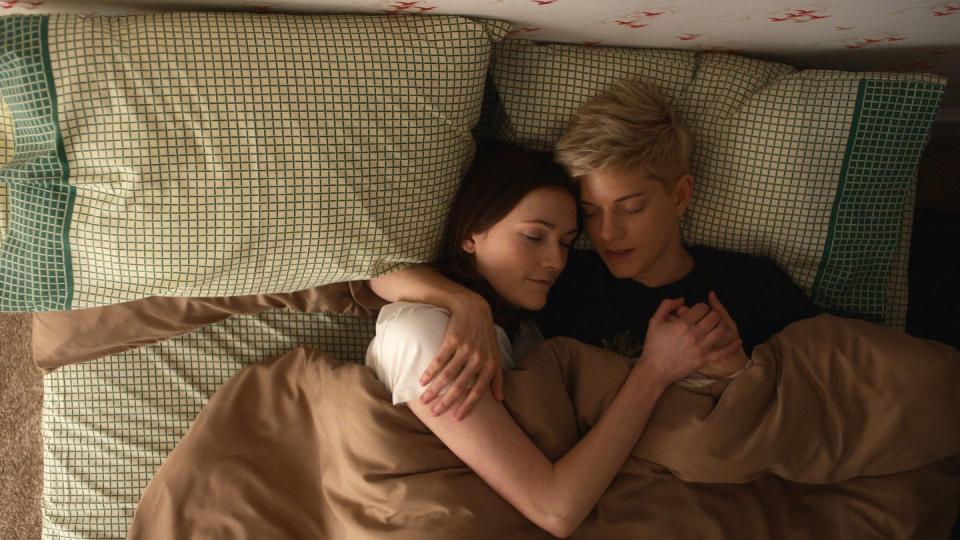Feel Good made a really smart choice about gender

Feel Good spoilers follow.
Back in April, comedian, writer and actor Mae Martin shared an intimate part of themself with the world.
"The way I feel about my gender identity is ongoing and evolving, and it's personal," they wrote in a post on Instagram. "But I thought it might be good to say for clarity and in case anyone finds it helpful – I'm non-binary, my pronouns are they/them and she/her."
From Shrill's Lolly Adefope to The Crown's Emma Corrin, Martin's news was met with a tidal wave of love and support.

But Martin also wants people to know that being non-binary is "just one part" of who they are, "and not the main part at ALL", a sentiment that they echoed in an interview with The Guardian last year: "I got heckled the other night. I was talking about gender identity and this woman shouted, 'No one cares!' It was so harsh, but I couldn't stop laughing. Partly because I was in control and partly because, well, I replied something like, 'The problem is that people actually care too much!'"
That's the route that Feel Good season two, the semi-autobiographical comedy-drama which Martin co-wrote and stars in alongside Charlotte Ritchie, travels down when unpacking the protagonist's identity.
In the latest chapter, Mae is still working through how they perceive themself, but they've reached a certain degree of understanding.
"I don't actually, really identify as a woman these days, just so you know," they tell their rehabilitation counsellor, played by Eve.
"What do you identify as?" she asks. There's no hint of interrogation or debate. There's no ulterior motive. Her question is sincere, with a view to helping Mae feel secure.
When you're processing who you are, you repeatedly subject yourself to interrogation. That is enough to contend with without external voices assuming a barrister-esque role as they hurl question after question in your direction.
"Err, kind of like an Adam Driver or a Ryan Gosling," they respond. "I'm still working it out."
And that's the extent of their conversation about Mae's identity. Eve's character doesn't push for answers, or demand certainty or clarity. It just is and in a heartbeat, the narrative moves on. If you're looking for a polemic, expect to feel underwhelmed. If you've come to Feel Good with the assumption that Martin and their co-writer Joe Hampson will hand-hold you throughout, you'll be left feeling unsteady on your feet.
Feel Good wasn't devised as an educational exercise, but created to entertain, as Martin has reiterated on multiple occasions. The fact that so much of the story has been mined from Martin's own life and experience imbues it with such richness and authenticity that it can't help but provide wisdom, or a certain type of education in places.
But unlike so much of what is taught in the classroom, it doesn't have all of the answers to life's biggest questions, and both Martin and the character Mae's relationship to their gender cannot be pinned down. It's not exact or quantifiable, and because of that Feel Good itself itself is fluid in how it explores the subject.

That tenderness is again evident in the finale when Mae asks George (Ritchie) whether she perceives them as a "boy or girl".
"Just you, really," she replies. George then asks her partner the most important question and again, there are no undertones. It's not a loaded query designed to make Mae feel small, or justify their own existence, but motivated by a genuine will to understand Mae, and to create a safe environment for her partner to be their authentic self: "More importantly, how do you see you?"
It's such a simple question but it wields so much power. It illustrates that conversations around gender and identity don't have to descend into tumult. And it should also serve as the blueprint for how those conversations should unfold right here, in our own world and not within the framework of a Netflix drama.
Again, Mae feels unable to encapsulate exactly how they feel about themself, which prompts George to float the prospect that they're most likely non-binary.
"You tell me and I'll use the right words," she says.
"I sort of wrote my dream version of how people would engage with me about that issue," Martin told Digital Spy. "So George making space for Mae to just feel comfortable and take it at their own pace was really nice."
Like Mae's exchange with their counsellor, that conversation lasts a couple of minutes at most before the pair of them are hotfooting it through the streets of Toronto as they try to outrun a pair from Mae's past. It's part of Feel Good, but it's not all of it.

Martin also discussed why they made the decision to dial back all of the noise and hysteria that is so often attached to those conversations, and traverse the topic with a gentle, subtle hand: "I think it was just more honest to me personally that I am figuring it out, and that it can be incredibly stressful and painful, but also very funny. The perfect example is even in this interview. You're effortlessly using "they" pronouns and I keep f**king up my own pronouns [laughs] because I keep forgetting which one I'm using. So that's a perfect example of trying not to take it too seriously, and being vulnerable, but also honest about it. It's an ongoing process."
Ritchie added: "George represents the work that people have to do in allowing a world – or creating a world – where that doesn't have to be something that is a humongous deal. The onus is so much on mainstream culture to adapt itself, to understand that there is not a binary existence. It's just not true. I think that's a really important part of the show."

Mae continues to find themself in a plethora of situations in Feel Good's second outing – some more unexpected than others – but one scene that wasn't included was a coming out party, complete with bunting and tequila shots. There's certainly a need for those moments on-screen, but it would have felt off-kilter here. Mae is still wading through their own thoughts, and it also chimes with Martin's belief that people shouldn't have to declare how they define themselves if they don't want to, or don't feel ready to.
The world might demand that of you, but Martin wants you to know that those details can be as big or as small as you want them to be. Ultimately, they want you to feel good.
This month, Digital Spy Magazine counts down the 50 greatest LGBTQ+ TV characters since the Stonewall riots. Read every issue now with a 1-month free trial, only on Apple News+.
Interested in Digital Spy's weekly newsletter?Sign up to get it sent straight to your inbox – and don't forget to join our Watch This Facebook Group for daily TV recommendations and discussions with other readers.
You Might Also Like

 Yahoo News
Yahoo News 
